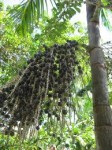
Juice bar in Manaus, Brazil

Acai berry palm tree
During a recent trip to the Amazon region of Brazil I got to see "up close and personal" the palm trees that produce the acai berry (ah-sigh-EE) which has gained popularity across the U.S. as a "super food". I also visited a juice bar in Manaus, the biggest city in the Amazon region and enjoyed a smoothie made from acai juice and other tropical fruits. The acai berry has also been a key component for fad diets and is being added to cosmetics and other beauty products. So, what is the fact, or fiction, surrounding this humble (but colorful) berry!
I spent an afternoon looking for scientific studies and found very little. Most of the information available is from the popular press and on websites and blogs promoting and selling acai products (and, of course, raving about its health properties).
Acai berries contains anthocyanin and flavonoids, powerful antioxidants that help defend the body against life stressor's. Antioxidants and other nutrients are needed by the body to protect against cell damage. The benefit of dietary antioxidants is that they slow the chemical process of oxidation by neutralizing free radicals that are harmful by-products made by the human body. This oxidation is what causes narrowing of the arteries and heart-related problems due to cholesterol deposits. Antioxidants also may reduce the risks of certain forms of cancer but this still undergoing further study.
According to researchers at the Texas A & M University, the berry is naturally low in sugar and hints of a mixture of "red wine and chocolate". These same researchers found that the pulp and juice of the berry is absorbed by the body so it is a good source of antioxidants. The University of Florida is also doing research on acai. At this time, there is no evidence that this berry is superior to other sources of antioxidants such as blueberries and strawberries so claims that it is a superfood are premature.
Claims made by makers of supplements that contain acai do raise concerns. While acai berries by themselves contains beneficial antioxidants, supplements usually contain other ingredients that may be unhealthy. Caffeine is a common component of weight loss supplements and is known to cause head and stomach aches and other side effects. Acai berries also contain some minerals that in large doses may be toxic to certain individuals. If you have allergies to pollens and trees, you could be susceptible to an allergen in the acai berry.
The bottom line, it's probably okay to try a smoothie made with acai (you may like it!), be skeptical of fad diets that make claims about huge weight loss due to the acai berry, and continue to watch for new, solid research as we learn more about this purple berry.
